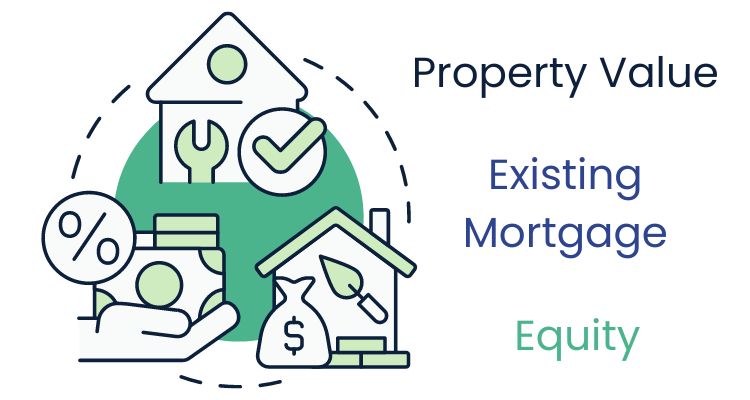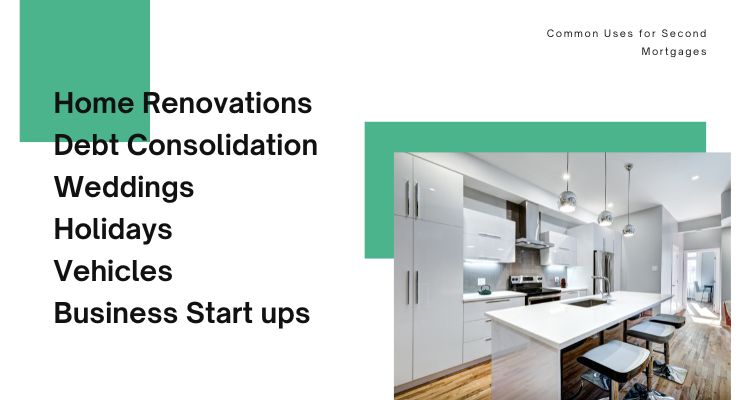A second mortgage is a type of loan that allows you to borrow against the equity you’ve built up in your property. Think of equity as the portion of your home that you actually own – it’s the value of your home minus any debt you still owe on it, like your original mortgage.
When you go for a second mortgage, the lender puts a second lien on your home, which means your home serves as collateral. This can be a good financial move if you’re looking to consolidate debt, fund home renovations, or cover significant expenses.
By taking out a second mortgage, you’re agreeing to repay the debt over a period, just like you did with your first mortgage. The interest rates might be a tad higher, but that’s the trade-off for accessing your equity without selling, or completely refinancing.
But remember, because your home guarantees the loan, it’s important to assess your ability to manage the additional debt to avoid putting your property at risk.
As with any financial decision, understanding what you’re getting into is the key to success.
Table of Contents
What is a Second Mortgage?

A second mortgage is a loan that you take out against the value of your home, on top of your existing, or primary, mortgage. It’s secured against the equity which is the portion of your home that you actually own.
For example, if your home is valued at $500,000 and you owe $300,000 on your original mortgage, you have $100,000 in equity that could potentially be accessed through a second mortgage (if borrowing up to 80% of the value of your property).
Types of Second Mortgages
There are typically two types of second mortgages:
- Home Equity Loans: This type of loan provides you with a lump sum of money upfront, which you pay back with interest over a set term. It’s akin to your original mortgage but secured against the equity you now have in your home.
- Home Equity Line of Credit (HELOC): A HELOC operates more like a credit card; you have a credit limit you can borrow against, repay, and borrow again. The interest rates are generally variable, and you only pay interest on the amount you draw.
Differences Between First and Second Mortgages
Your second mortgage differs from the first mortgage. Here are the key differences:
- Interest Rates: Typically higher for second mortgages due to increased risk.
- Payment Structure: You might have the option of interest-only payments for a period.
- Type of Loan: You could choose a lump sum (known as a home equity loan) or an equity line of credit, which works more like a credit card with a limit based on your equity.
Remember, a second mortgage still means an additional monthly payment on top of your primary mortgage, so you need to ensure you can manage both repayments. As with your first home loan, your house serves as collateral for both loans.
Interest Rates and Repayments
Your second mortgage will come with its own interest rate, which may be higher than your first mortgage due to the increased risk to lenders. This rate could be fixed or floating (variable), impacting your weekly, fortnightly, or monthly repayments.
Fees for Second Mortgages
A second mortgage incurs various fees, much like your original home loan. You’ll encounter set up fees, which are the charges from your lender to process the new loan.
It’s also wise to consider any potential settlement costs and the possibility of refinancing both mortgages to obtain better interest rates.
Our Auckland based mortgage brokers will explore the lowest cost options and present you with all the fees, so you know what you’re getting into.
How Much Can I Borrow For a Second Mortgage?

Your borrowing power hinges on several key factors, including the equity in your home, your credit score, and your ability to service the loan based on your income and existing debts.
In 2024, the debt to income ratio rules are changing which could affect borrowing power for many New Zealanders. Learn more about debt to income changes here.
The Role of Equity
Equity is central to determining how much you can borrow for a second mortgage. It’s calculated by subtracting the amount you owe on your first mortgage from the current home value.
Lenders often allow you to borrow up to 80% of this value. This is knows as a loan to value ratio (LVR).
As I mentioned in the example above, if your home is valued at $500,000 with $300,000 outstanding on your mortgage, you could potentially access up to $100,000 in equity.
You might be able to access more, but this would be at a higher cost. You’d need to factor in low equity margin fees onto the cost of the loan.
Credit Score Requirements
Like all lending, your credit score plays a role in securing a second mortgage. A good credit score not only increases the likelihood of approval but can also fetch you better interest rates. But…
If your credit score is on the lower end of the scale don’t despair. At OneStop Financial Solutions, we work with many second tier lenders to secure non bank loans.
Income and Debt Considerations
Lenders will assess your income and debt-to-income (DTI) ratio to ensure you can manage the additional loan repayments. A low DTI ratio shows a good balance between your debt and income, commonly preferred to be under 36%.
Additionally, lenders will consider your assets as part of the application process. Your ability to maintain repayments on both your mortgages is essential.
Lenders will scrutinise your financial stability before making a decision. Our mortgage advisers can give you advice on which debts you should pay down first to put your best foot forward for the banks.
Pros and Cons of Second Mortgages
When considering a second mortgage, you need to weigh the potential benefits against the inherent risks. This type of loan can provide you with significant funds, but it’s not without its downsides.
Pros of a Second Mortgage:
- Access to Funds: You can access a substantial amount of money, which is often more than other loan types, to cover big expenses or invest in significant home renovations.
- Lower Interest Rates: Compared to unsecured debt like credit cards, a second mortgage often has lower interest rates since your home acts as security.
Cons of a Second Mortgage:
- Risk: If you default on your loan, you risk losing your home as it serves as the guarantee for the loan.
- Additional Costs: You might encounter extra fees in obtaining and settling the second mortgage. Interest rates are generally higher than first mortgage rates.
- Equity Reduction: By taking out a second mortgage, you’re reducing the amount of home equity you have, which can complicate future financial plans or reduce potential profits from selling your home.
Using a Second Mortgage

Here are the most common uses for a second mortgage:
Debt Consolidation
Taking out a second mortgage can offer a way to consolidate debt. For example, if you’re juggling several high-interest credit card debts, you could use a second mortgage to pay them off.
This means you’ll have just one repayment to manage each month, potentially at a lower interest rate, making it easier to keep on top of your finances.
Just remember to get rid of the credit cards and don’t spend beyond your means.
Funding Home Renovations
Whether you’re updating your kitchen or adding an extension, funding home renovations can be made easier through a second mortgage. This option often provides a lump-sum payment, which you can use towards your renovation costs.
The benefit here is that, unlike credit cards, the interest rates are typically lower. Plus, renovating your home could increase its value over time, which might make this debt seem like an investment in your property’s future.
Financing Large Expenses
If you’re considering higher education or facing other large expenses, a second mortgage might be a suitable financing option. It’s a secured loan, meaning you might get a better interest rate compared to personal loans.
With options like home equity lines of credit (HELOCs), you even have a draw period where you can access funds up to a certain limit as you need them. Remember that proper documentation will likely be needed to secure the loan, and if a HELOC is used, you’ll make monthly payments only on the amount drawn.
Keep in mind that these loans often don’t require mortgage insurance, resulting in further potential savings.
Alternatives to Second Mortgages
If you think a second mortgage might not be the best choice for you, here are some other options to consider:
Personal Loans and Credit Cards
A personal loan can be a viable alternative if you need access to funds without tapping into your home equity. Personal loans often follow a straightforward application process and could have fewer underwriting requirements compared to a second mortgage. They typically come with fixed interest rates, which means your repayments are predictable.
In contrast, credit cards can offer flexibility and immediate access to funds. If you’re facing expenses that can be paid off quickly, a credit card with an introductory 0% interest offer might be advantageous.
Be aware that after the promotional period ends, the interest rates can be significantly higher compared to other lending options.
Refinancing Options
Refinancing your existing mortgage might be a smart choice, especially if you can secure a lower interest rate or a fixed rate. Refinancing can allow you to cash out some of your home equity while potentially lowering your monthly payments.
A Home Equity Line of Credit (HELOC) is another refinancing option where you’re granted a credit line you can draw from as needed, up to a certain limit. HELOCs often have lower interest rates than credit cards and personal loans because they’re secured against your home. However, this also means your home is at risk if you fail to make payments. Unlike a second mortgage which provides you with a lump sum, a HELOC gives you the flexibility to borrow only what you need when you need it, usually at variable rates.
FAQs about Second Mortgages

Here are some questions we get asked a lot about second mortgages.
-
Can you refinance a first and second mortgage together?
Yes, you can refinance your first and second mortgages into one loan, if eligible. This might simplify your payments and potentially lower your overall interest rate.
-
Is a second mortgage a home equity loan?
Yes, a second mortgage is another term for a home equity loan, where you borrow against the equity in your home.
-
What is a soft second mortgage?
A soft second mortgage is often a subordinate, low-interest or deferred-payment loan designed to assist you with the initial costs of purchasing a home. It’s typically aimed at first home buyers and may be part of a government or non-profit housing affordability program.
-
Can you obtain a second mortgage with poor credit?
Obtaining a second mortgage with poor credit is not impossible. Lenders may be more hesitant and you’ll likely face higher interest rates, but if you have significant equity in your home and a stable income, it may still be attainable.
-
Can you take out a second mortgage for renovations?
A second mortgage is a great way to fund renovations and larger home improvements. Consider the interest paid over the term of the loan when evaluating the costs.
-
How much equity do I need for a second mortgage?
You need at least 20% equity in your home to qualify for a second mortgage.
-
How many years is a second mortgage?
The term for a second mortgage can vary, usually ranging from 5 to 25 years.
-
How much deposit is needed for a second mortgage?
You don’t need a deposit for a second mortgage, but you must have sufficient equity in your home.
-
How much do second mortgages cost?
Costs can include interest rates, application fees, valuation fees, and legal costs. Interest rates are usually higher than for first mortgages.
-
Do second mortgages attract stamp duty?
In New Zealand, there is no stamp duty on mortgages, including second mortgages.
-
Is a second mortgage a lien?
Yes, a second mortgage is a lien on your property, subordinate to the primary mortgage.
-
Is a second mortgage a refinance?
No, a second mortgage is a separate loan in addition to your primary mortgage, whereas refinancing replaces your existing mortgage with a new one.
-
Is a second mortgage tax deductible?
In New Zealand, mortgage interest is not tax-deductible for owner-occupied properties.
-
What are current second mortgage rates?
In 2024, Current second mortgage rates in New Zealand vary, typically ranging from 6% to 12%, depending on the lender and your financial profile.
Can you have two second mortgages?
It is possible to have two second mortgages (or multiple secondary loans) on the same property, but it is quite rare and difficult to obtain from mainstream lenders.
Here are a few key points:
- Major banks or tier 1 lenders in NZ typically do not allow taking out a second mortgage behind their existing loan.
- Some non-bank or second-tier lenders in NZ may consider providing a second or even third mortgage as a form of secured lending against the equity in the property.
- Secondary loans have higher interest rates (e.g. 9.95%+) because the lender takes on more risk being second or third in line behind other mortgage lenders.
- Strict criteria usually applies, such as having significant equity remaining in the property after accounting for all mortgage balances.
Got More Questions? Talk to Our Auckland Mortgage Brokers Today



